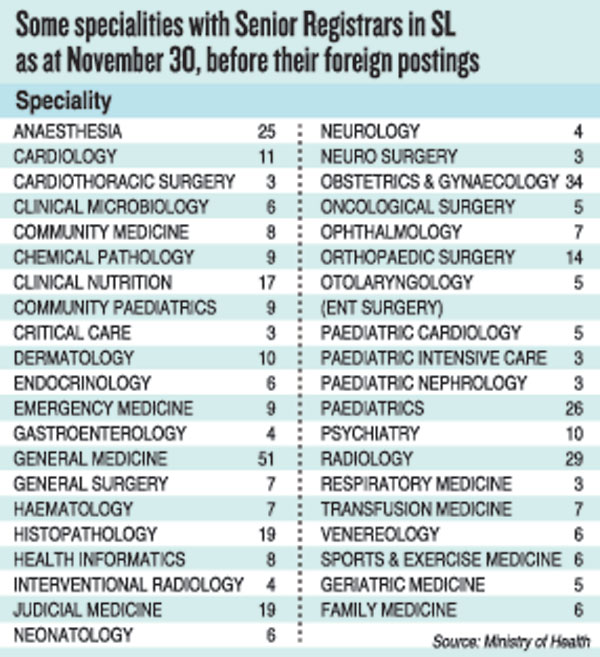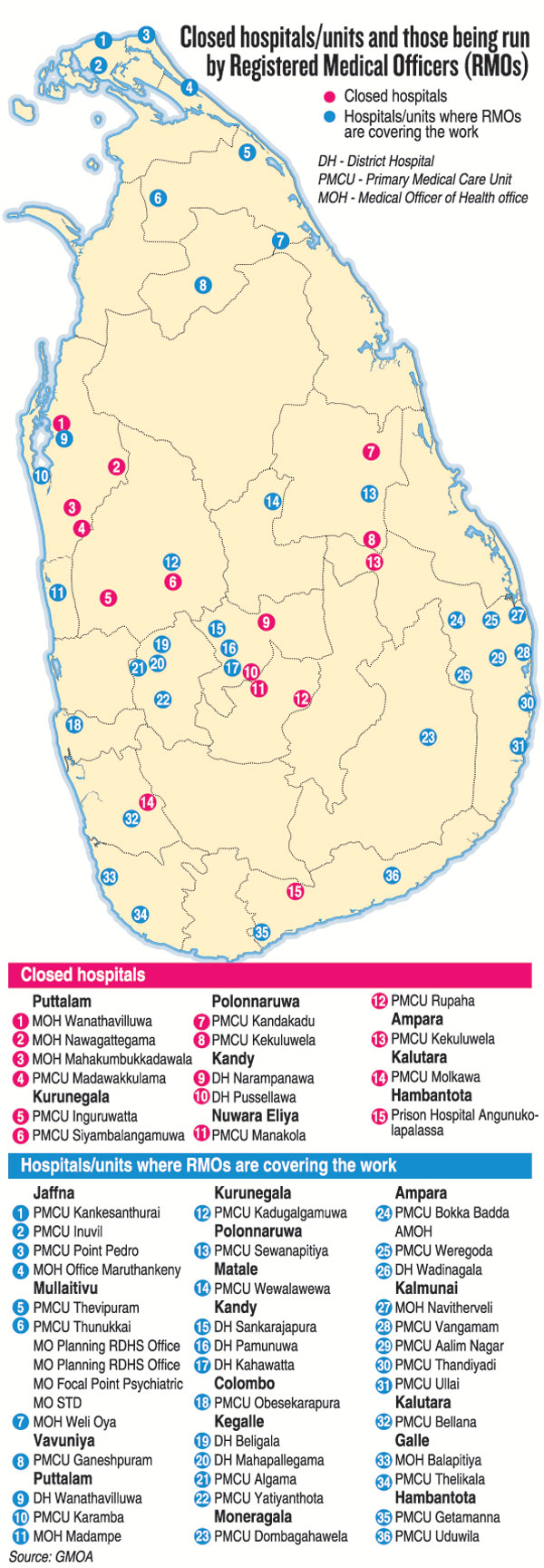News
Borrowing specialists from one to run another hospital, with no permanent solution in sight
View(s):- Urgent call to provide incentives to retain doctors and prevent state health sector collapse
By Kumudini Hettiarachchi
Slowly but surely Sri Lanka’s health sector is beset by malaise due to the severe brain drain of medical specialists, the non-return of post-graduate specialist trainees, the potential retirement of specialists who turn 60+ and those who join either universities or the private sector.
While this is impacting the major hospitals, the Government Medical Officers’ Association (GMOA) had pointed out to the Health Ministry that 40 small hospitals and medical units across the country including District Hospitals (DHs), Primary Medical Care Units (PMCU) and Medical Officers of Health (MOH) offices have also been forced to shut down for lack of junior doctors. (See map)
Another 100 state hospitals also face closure soon, the GMOA has warned.
“We are in serious trouble in the major hospitals where specialized services are being provided,” many experts said, pointing out that the Health Ministry did not seem to have a plan to meet this dire crisis.
The ministry’s “modus operandi” seems to be to manage this crisis with Senior Registrars (SRs) who are in local training. Is this the answer, asked many experts, stressing that SRs should mandatorily work under the supervision of the relevant and experienced consultant to get maximum training.
Another problem with depending on SRs is that within a few months they would be heading out of Sri Lanka for their foreign training, once again leaving gaping shortfalls, said a specialist.
This source said that while adequate numbers seem to be getting into a lot of specialist training programmes (see graphic for latest list), is it fair to get them to man stations alone?

Paying tribute to hardworking SRs, the source also raised the concern of what incentives would be provided to them to return to Sri Lanka once their foreign training is concluded. This also applies to all specialists and juniors already serving the country.
Many questioned what urgent measures the authorities are taking to halt this disaster. “All talk and no action,” is what the authorities are engaged in, was the criticism by experts, who pointed out that many have been sounding a red alert about the state health sector’s crisis, but to no avail.
Has anyone given any thought to the thousands of men, women and children who access the state hospitals, asked another in desperation, referring to yet another committee being appointed by the Health Minister to look into the matter – but is there a timeframe to come up with solutions?
In the past eight months, the Sunday Times has published specific details of the dearth in each and every specialty, along with suggestions not only from ground-level experts but also such organizations like the Sri Lanka Medical Association (SLMA) and trade unions such as the Association of Medical Specialists (AMS) and the GMOA.
When contacted, a ministry source who declined to be named said that the ministry has made many recommendations to the authorities including salary increases, financial and non-financial allowances and also better facilities such as good quarters in the outstations, to stop doctors from leaving the country. There was hope that there would be some respite for doctors next month.
Focusing on the so-called ‘brain drain’, the source argued that it was really not so, as doctors and nurses were leaving the country not for higher positions but for more financial gain. This is because in addition to the direct taxes imposed on professionals, there are numerous indirect taxes which have made the cost of living skyrocket in Sri Lanka and living within one’s means impossible. 
Before looking at the medical specialties badly-hit by a dearth, the source said that there was also a responsibility on the part of the doctors to follow protocols if and when they wanted to leave Sri Lanka for greener pastures.
“Do you know that the Establishment Code, circulars and guidelines require permission to be sought, depending on one’s level even from the Prime Minister, when applying for leave to go abroad? This is not being implemented,” the source said, adding that some are leaving “paduratath nokiya”.
According to the ministry official:
From January 9, 2022 to November 5, 2023 there have been – 481 post-graduate trainees as medical specialists
The numbers who have resigned or vacated their posts are: 165
Therefore, the number left is: 316
The number due to retire between 60+ and 63 is: 279
Arguing that there are adequate numbers to service the medical specialties, the source however conceded that there is a “major” shortfall in anaesthesiologists and transfusion medicine specialists and a shortfall in general surgery. There was also a dearth among psychiatrists.
One specialist, meanwhile, said that the authorities were just applying temporary plasters without taking solid action to solve the issue. They are attempting to keep the “big” hospitals running by sending the specialists from the periphery and smaller hospitals to those ones. They are putting temporary plasters and trying to run the system but the collapse will gradually shoot its tentacles from the periphery to the major hospitals too.
Another “plaster applying” process without treating the underlying causes is pulling out one specialist from a two-man station and relocating that person at a major hospital, said the same specialist, adding that then the person running the unit single-handedly would be so over-worked that the person would want to quit the state health sector.
No one doubts that the premier centres in the major cities need to function smoothly but where are the permanent solutions, asked another specialist, calling what is happening now: “Atuwa kadala putuwa hadanawa wagey.”
Here are the numbers for general surgery secured by the Sunday Times:
The vacancies published in the Annual Transfer List 2023 – 24
In addition, the actual vacancies due to surgeons applying for leave and migrating – 14
The number of vacancies by December 31, 2023, in the end-post list due to be published next week – 9
Therefore, the total dearth of surgeons would be: 24+14+09 = 47
Of 8 board-certified (certified by the Post-Graduate Institute of Medicine), only 4 are in Sri Lanka
In the replacement list, there are only 1 board-certified and 8 Acting Consultants
Therefore the shortfall is: 47-4 = 43-9 (1+8) = 34
There are 9 Senior Registrars awaiting foreign training. If they return in one or two years, there would still be a shortfall of: 34-9 = 25
This is while 18 surgeons would go home if the 60+ retirement plan is implemented
The 24 vacancies for general surgeons are at:
National Hospital of Sri Lanka (NHSL) – 2 & Kandy National Hospital – 1
Teaching Hospitals: Anuradhapura – 1 & Karapitiya – 1
District General Hospitals: Ampara – 2; Kilinochchi – 2; Mannar – 1; Moneragala – 1 & Mullaitivu – 2
Base Hospitals (A): Dick Oya – 1; Kalawanchikudy – 1 & Medirigiriya – 1
Base Hospitals (B): Dehiattakandiya – 1; Maha Oya – 1; Mahiyanganaya – 1; Nikaweratiya – 1; Samanthurai – 1; Tambuttegama – 2 & Warakapola – 1
| Dehiattakandiya patients face ‘unkindest cut’ of all A pathetic plea has gone out from the Dehiattakandiya Base Hospital for the urgent appointment of a General Surgeon or at least a Senior Registrar (SR). Pointing out that earlier the hospital was performing about 50 major surgeries including emergency and life-saving operations per month, the Medical Superintendent (MS) has reiterated that all these have ground to a halt, impacting heavily on patients. The MS has requested the urgent appointment of a surgeon, as the SR who had been serving there has gone for his overseas training and there has been a vacancy for over eight months. | |
The best way to say that you found the home of your dreams is by finding it on Hitad.lk. We have listings for apartments for sale or rent in Sri Lanka, no matter what locale you're looking for! Whether you live in Colombo, Galle, Kandy, Matara, Jaffna and more - we've got them all!

